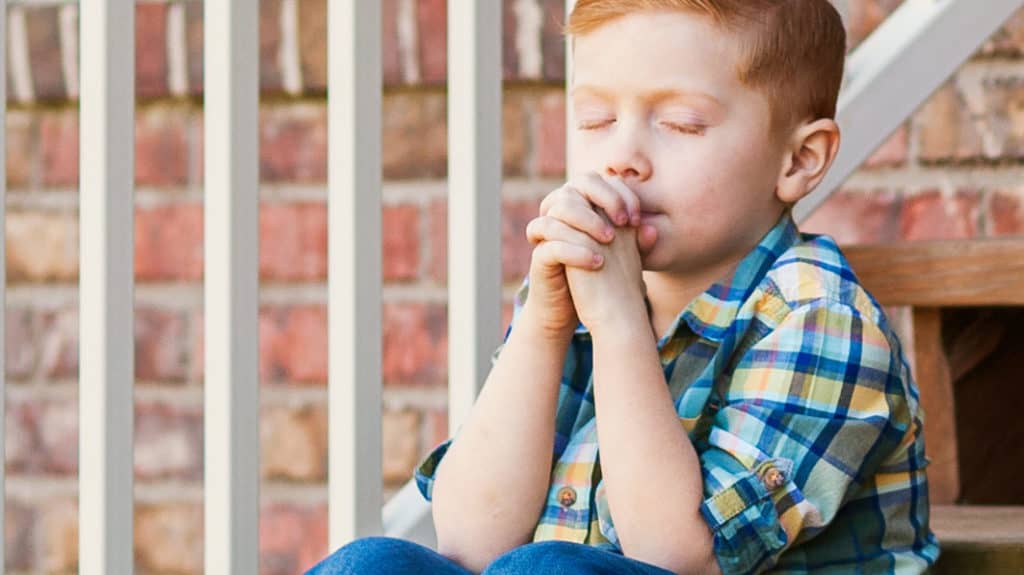
Freedom in Christ
Here are faith activities to teach kids about freedom through our relationship with Jesus.

Most parents want to help their kids develop a relationship with God that is fueled by prayer. Here’s how to start.
One morning a few years ago, our cat, Pepper, disappeared. We searched the house, the yard and the neighborhood, but the black-and-white ball of fluff was nowhere to be found. I tried telling my son Ethan that Pepper would probably find her way home, likely around dinnertime, but he didn’t seem satisfied with my words. He sat on the front steps and closed his eyes.
“Dear God,” he prayed. “Please help Pepper. You know where she is and how she got there. Please lead her safely back home.”
Ethan’s little prayer warmed my heart, and it reminded me again that the one gift I want to pass along to my children is a relationship of prayer with almighty God. Still, in that moment, I couldn’t help but think of all the old questions about prayer. Does God actually hear all of our little concerns? Will He answer? Does He care about a lost cat?
Later that day, Pepper came wandering back up our front walk. Ethan burst out the door, exclaiming, “I knew she’d come back! I prayed that she’d come home, and here she is!”
And just like that, my 7-year-old son’s faith deepened as he learned to lean on God in prayer.
Most of us want to help our kids develop a relationship with God that is fueled by prayer. But what does that guidance look like? With all the minivan driving and schoolwork and baseball practices, is there space to focus on building a kids’ powerful prayer life? Can’t we just pray during those expected times: before meals and bedtime, or when friends are sick and pets are lost?
But seeing prayer as another item to add to our schedule misses the point. Prayer isn’t a task, but an invitation to a relationship. The Creator of the universe beckons us to His throne, and He wants to hear what we have to say. What’s more, prayer connects us to God’s direction and strength so that we may stand against evil. When we help our children see prayer as Scripture portrays it — as a resource, not a responsibility — we help them unwrap the gift of a deeper relationship with God.
It’s easy to see prayer from only our end of the exchange. “Is anyone listening?” your kids might ask. “Isn’t God too busy running the universe?”
The author of Hebrews reminds us that when we pray, we’re speaking to One who cares and can even relate: “For we do not have a high priest who is unable to sympathize with our weaknesses, but one who in every respect has been tempted as we are, yet without sin. Let us then with confidence draw near to the throne of grace, that we may receive mercy and find grace to help in time of need” (Hebrews 4:15-16).
Help your kids recognize that the Creator of the universe really does care for our concerns — He is a loving, sympathetic listener. We can approach Him boldly, knowing that He wants to hear what we have to say.
How did you teach your child to speak? Probably not with a doctorate in English. What’s true of our child’s language development is also true of their spiritual development: The best teacher is the example we set.
So the first step to helping children experience the gift of prayer is to let them see their parents praying. Model a prayer life that communicates your constant reliance on God. Throughout the day, let them hear your prayers, and tell them how these prayers are answered. Then talk about what God is teaching you through your prayer life.
When I was younger, the apostle Paul’s admonition to “pray without ceasing” baffled me (1 Thessalonians 5:17). My boys had a similar reaction. Without ceasing? We’re supposed to go through life with heads bowed and eyes closed? Help your kids see that this teaching refers more to a way of life, a constant awareness of God’s availability. We never stop returning to the resource of prayer. We seek God’s guidance as we head off to school, when we’re tempted or when we hear about a friend’s trials. We pray when we witness something noble and beautiful — or when we see evil. “Life becomes a continually ascending prayer,” wrote pastor John MacArthur. “All life’s thoughts, deeds and circumstances become an opportunity to commune with your heavenly Father.”
“Why didn’t God answer my prayer?”
I suppose most parents have heard some variation of that question, often when kids wonder why events didn’t turn out the way they wanted. First, help kids understand that answered prayer doesn’t necessarily mean getting what they want. Instead, God can grant requests or not, or change our hearts or do something else entirely. All are answered prayer.
The question isn’t whether He answers prayer, but whether it is in our best interest for Him to give us what we want. We need to stress that God, in His perfect wisdom, gives us what we don’t even know to ask for.
As parents, we have a unique perspective on this point. Our job is to know what’s best for our kids and to enforce the principles that help them grow in wisdom. And we want our kids to yield to our experience — we know that reasonable bedtimes make healthier children, that misbehavior needs correction and that dinners are not built out of doughnuts. Help your kids see that just as parents make wise decisions, which sometimes seem unpleasant, so also is God able to see a bigger perspective. For younger children, have them consider how their pet may not want shots or a bath but the shots keep the animal healthy and baths keep them clean. These are part of a bigger perspective, too.
It’s probably no surprise that God doesn’t judge prayers as humans do. He sees our heart, not our polish and articulation. Even when we don’t know how to pray, perhaps when we’re sad or having difficulty expressing our feelings, God’s Spirit “intercedes for us with groanings too deep for words” (Romans 8:26).
As we teach our kids how to pray, we can also point them to the many example prayers found in Scripture. We could start in Matthew 6, where Jesus simply says, “Pray then like this,” before giving us a model in the Lord’s Prayer. We can go through the Psalms, discussing the meaning of these beautiful prayers and encouraging our children to memorize a few of them.
I also love helping my boys focus on how Bible heroes prayed. Daniel prayed when his life crumbled around him. King David, when victorious in battle, approached God’s throne with awe and humility. Mary, in complete faith, yielded to God’s perfect will. And God’s own Son constantly modeled the privilege of seeking His Father’s direction and presence.
The beauty of parenting is that we can help our children learn about prayer, even as they watch us grow deeper in our prayer life. Together, parents and children can witness firsthand how the gift of prayer is key to a relationship with God.
Amy Parker is the author or co-author of several children’s books on prayer, including PrayerWorks: Prayer training and strategy for kids.